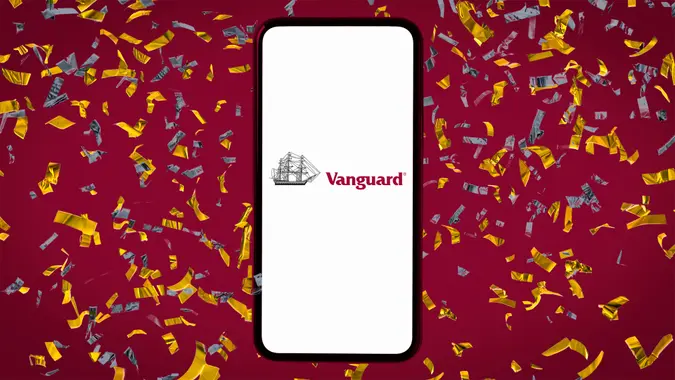E*TRADE CD Rates and Terms for 2026

Commitment to Our Readers
GOBankingRates' editorial team is committed to bringing you unbiased reviews and information. We use data-driven methodologies to evaluate financial products and services - our reviews and ratings are not influenced by advertisers. You can read more about our editorial guidelines and our products and services review methodology.

20 Years
Helping You Live Richer

Reviewed
by Experts

Trusted by
Millions of Readers
E*TRADE from Morgan Stanley is a financial services company known for its commission-free trading of stocks, exchange-traded funds (ETFs) and mutual funds. It also offers access to bonds, futures and options for a fee — along with brokered and banking certificates of deposit (CDs).
E*TRADE CD Rates: February 2026
E*TRADE CDs come with no monthly maintenance fees and no minimum deposit requirement. Your interest will compound daily. Here are the current CD rates:
| Term Length | Annual Percentage Yield (APY) | Minimum deposit |
|---|---|---|
| 6 months | $0 | |
| 9 months | $0 | |
| 12 months | $0 | |
| 18 months | $0 | |
| 24 months | $0 | |
| 36 months | $0 | |
| 60 months | $0 |
What Are Brokered CDs?
Brokered CDs are similar to traditional bank CDs — they’re fixed-rate investments that guarantee a set return as long as you hold them until maturity.
Unlike standard CDs, brokered CDs can be bought and sold on a secondary market without penalties, allowing you to access your funds by selling rather than cashing out early.
They’re also FDIC insured — up to $250,000 per issuing bank. If you purchase multiple brokered CDs from different banks within the same account, your total FDIC coverage increases by $250,000 for each issuing bank.
Brokered CDs at E*TRADE
For brokered CDs, the rates differ depending on which bank issued the CD. When you buy a brokered CD, you purchase it through E*TRADE with the option to sell it before it matures.
You can buy a newly issued brokered CD from any of the hundreds of banks listing new CDs for sale through the E*TRADE brokerage with no fees or commissions. If you want to purchase a CD on the secondary market, expect to pay $1 per CD.
E*TRADE CD Fees and Early Withdrawal Penalties
You can withdraw your money from your CD within 7 days of opening it without having to pay a penalty. If you withdraw your money after that, you will have to pay back a certain amount of interest based on the term of your CD. Here are the penalties based on the term:
| Term | Penalty – Days of Interest |
|---|---|
| 3 months | 20 |
| 6 months | 45 |
| 7 months | 50 |
| 9 months | 70 |
| 11 months | 80 |
| 12 months | 90 |
| 18 months | 135 |
| 2 years | 180 |
| 3 years | 270 |
| 5 years | 450 |
Can You Sell Your E*TRADE CD Before It Matures?
If you purchase a CD from E*TRADE and decide you want to sell it before the maturity date, you won’t pay any fees if you can sell it on the secondary market. But if the interest rate on your CD is lower than current market rates, you might have to sell the CD at a loss.
Brokered CDs are callable, which means the CD issuer could decide to close the CD before the maturity date.
How E*TRADE CDs Compare
When you’re shopping for CDs online, you’ll want to weigh your options to find the best product for you. Here are some other brokerage accounts that also sell CDs:
Charles Schwab
Charles Schwab is a top brokerage offering fixed income investments, including CDs through Schwab CD OneSource. The CD rates are higher than what you might find at traditional banks. Schwab offers both callable and non-callable CDs.
Here are the CD rates for Charles Schwab:
| Term | APY |
|---|---|
| 3 months | |
| 6 months | |
| 9 months | |
| 1 year | |
| 18 month | |
| 2 years |
When you purchase Schwab CDs through the secondary market, you’ll pay a transaction fee of $1 per CD.
Fidelity
Fidelity is another excellent option for investors looking to buy brokered CDs. One advantage of Fidelity is that you can purchase fractional CDs starting at $100. You’ll need a minimum investment of $1,000 for most CDs from Fidelity.
Here are the current rates for newly issued CDs from Fidelity:
| Term | APY |
|---|---|
| 3 month | |
| 6 month | |
| 9 month | |
| 1 year | |
| 18 months | |
| 2 year | |
| 3 year | |
| 4 year | |
| 5 year |
Pros and Cons of E*TRADE CDs
Brokered CDs have many advantages over bank CDs, including the flexibility to try and sell them on the secondary market if your financial situation or goals change. Here are some of the pros and cons of E*TRADE’s brokered CDs.
Pros
- FDIC-insured
- Interest rates may be higher than most traditional bank CDs
- Option to sell on secondary market
- No monthly maintenance fees
Cons
- CD may be callable, which could mean lost interest earnings
- May be difficult to quickly sell on the secondary market
- Interest is not typically compounded
How To Open an E*TRADE CD
If you don’t have an E*TRADE account, you’ll need to set one up.
- Open an account online and provide some personal information.
- Log in and click the type of CD you want.
- Search for the product you want based on new issue or secondary market, yields and maturity dates.
- Transfer funds to your account.
- Choose the CD you want to buy.
- Read the fine print, making sure you understand withdrawal penalties and term limits.
- Purchase the CD.
Who Is an E*TRADE CD Best For?
An E*TRADE CD is best for investors who already have an E*TRADE account and want the ease of managing their investments on one platform. E*TRADE CD rates may be better than many traditional banks, but you could find even higher rates from other trading platforms.
E*TRADE CDs also provide estate protection, which means that the CD can be redeemed at face value, regardless of market price, by an heir if the original account holder dies. For people concerned about wealth preservation, CDs are a low-risk way to hold funds, giving your loved ones easy access to cash should you pass.
Anyone looking for fixed and stable investments with low risk to diversify their portfolio might consider E*TRADE brokered CDs.
E*TRADE CD Rates FAQ
Here are the answers to some of the most frequently asked questions on E*TRADE CDs.- What’s the minimum deposit for an E*TRADE CD?
- There's no minimum deposit required to open a CD at E*TRADE.
- How do E*TRADE CD rates compare to other banks?
- E*TRADE CD rates are competitive and well above national averages. However, you might be able to find better rates at some top online banks and credit unions.
- Can I get my money out of an E*TRADE CD early?
- If you withdraw funds from your CD before the term is complete, you will face a penalty. The penalty amount varies based on the original CD term but goes up to 450 days of simple interest.
John Csiszar contributed to the reporting for this article.
Editorial Note: This content is not provided by any entity covered in this article. Any opinions, analyses, reviews, ratings or recommendations expressed in this article are those of the author alone and have not been reviewed, approved or otherwise endorsed by any entity named in this article.
Rates are subject to change; unless otherwise noted, rates are updated periodically. All other information on accounts is accurate as of Jan. 26, 2026.
 Written by
Written by  Edited by
Edited by 

























